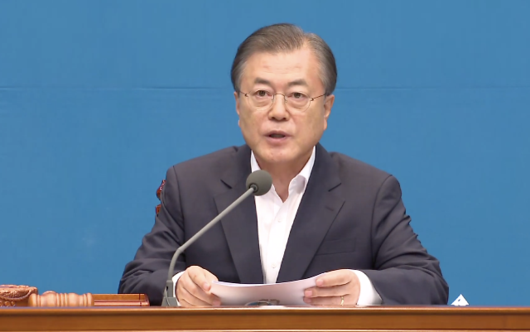 |
<이미지를 클릭하시면 크게 보실 수 있습니다> |
SEOUL -- Elated at a project to establish a new industrial cluster, President Moon Jae-in pledged all-out support to nurture carbon fiber as South Korea's new growth engine, saying it would become a strategic national industry to reduce dependence on core materials from Japan.
"In order to become a country that no one can shake and a responsible economic power, we must reduce our dependence on certain countries of core material," Moon said in a congratulatory speech on Tuesday when the Hyosung Group signed an agreement with local governments and contractors on a carbon fiber cluster project.
"It's the beginning. We can show the potential of South Korea as a manufacturing powerhouse again," Moon declared, praising Hyosung's preemptive investment to expand production in its carbon fiber plant in Jeonju, 188 kilometers (116 miles) south of Seoul.
Hyosung, which became the first South Korean company to produce carbon fiber since 2013, earmarked an investment of one trillion won ($828 million) until 2028 with the goal of becoming a global player in the carbon fiber industry. The group's carbon fiber business unit plans to produce 24,000 tons of carbon fiber each year at 10 production lines starting in 2028. Currently, it has an annual output of 2,000 tons from a single line.
The ceremony comes as South Korea has been in full swing to localize key materials regulated by Japan, which excluded South Korea from a list of trusted trading partners nearly a month after restrictions were imposed on exports of three key materials used for the production of microchips and displays. Carbon fiber is a strategic commodity that will be directly affected by Japan's trade restrictions.
"The private sector's bold preemptive investment in carbon fiber, a key high-tech material, is significant," Moon said, adding the carbon fiber industry would receive full financial support and tax breaks, along with hydrogen-related companies. "Because carbon fiber will be incorporated into various industries such as hydrogen cars, wind power generation and defense industry, it will change the paradigm of manufacturing."
Moon has led a national campaign to adopt hydrogen fuel cells and electric batteries as a mainstream fuel in the future, with a roadmap to produce 6.2 million fuel cell vehicles for domestic consumption and exports by 2040. Because of its eco-friendly characteristics, fuel cells are considered the next-generation renewable power source.
"Carbon fiber is the key material for hydrogen cars," the president said. "As the demand for hydrogen cars increases as well, the demand for carbon fiber will increase greatly."
Lim Chang-won Reporter cwlim34@ajunews.com
Lim Chang-won cwlim34@ajunews.com
- Copyright ⓒ [아주경제 ajunews.com] 무단전재 배포금지 -
이 기사의 카테고리는 언론사의 분류를 따릅니다.
기사가 속한 카테고리는 언론사가 분류합니다.
언론사는 한 기사를 두 개 이상의 카테고리로 분류할 수 있습니다.
언론사는 한 기사를 두 개 이상의 카테고리로 분류할 수 있습니다.


